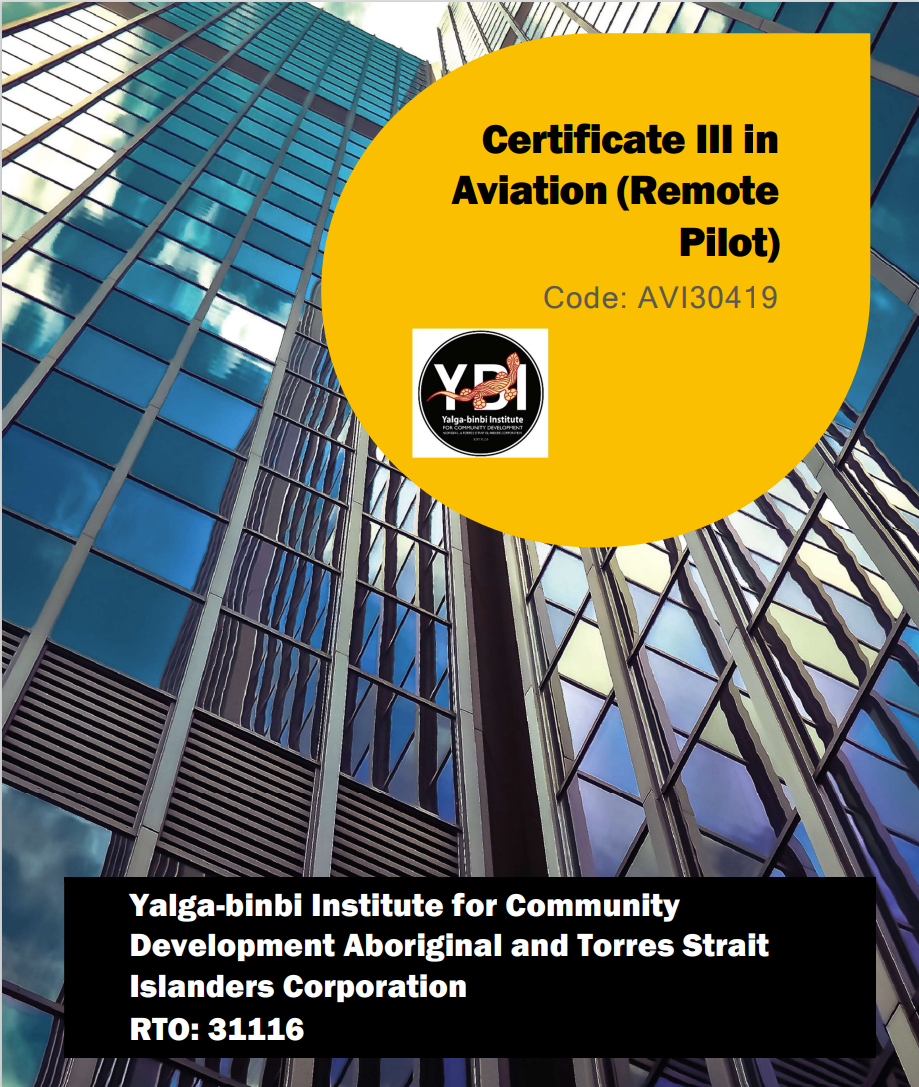SPECIAL MARITIME TRAINING CALENDAR
Certificate III in Aviation (Remote Pilot)
Qualification Code AVI30419
AU$3 999.00
Price incl. GST (0%) AU$0.00
AVI30419 - Certificate III in Aviation (Remote Pilot)
Save this product for later
Certificate III in Aviation (Remote Pilot)
Product Details
Qualification Description
|
This qualification is relevant to individuals operating remotely piloted aircraft systems (RPAS), in compliance with relevant regulatory requirements of the Civil Aviation Safety Authority (CASA) and national operating standards. Remote pilots operating at this level will apply non-technical and technical knowledge and skills to demonstrate autonomy and judgement and will take limited responsibility in known and stable operational contexts within established regulatory parameters. Licensing, legislative or certification requirements apply to this qualification at the time of publication. This qualification aligns to Remote Pilot Licensing requirements described in Civil Aviation Safety Regulation (CASR) Part 101 — Unmanned aircraft and rockets and Part 101 Manual of Standards. Civil and military personnel seeking certification as remote pilots should check requirements with CASA. |
Entry Requirements
|
There are no entry requirements for this qualification. |
Packaging Rules
|
A minimum of 14 units of competency comprising: 9 core units listed below plus 2 elective units selected from the Group A : General, plus At least 1 elective unit selected from the Group B : Specialist elective, plus At least 2 units selected from the Group C : Operation type elective units listed below The following units have a prerequisite unit:
|
|
|
Core units |
|
|
AVIF0021 |
Manage human factors in remote pilot aircraft systems operations |
|
AVIH0006 |
Navigate remote pilot aircraft systems |
|
AVIW0028 |
Operate and manage remote pilot aircraft systems |
|
AVIW0004 |
Perform operational inspections on remote operated systems |
|
AVIY0052 |
Control remote pilot aircraft systems on the ground |
|
AVIY0023 |
Launch, control and recover a remotely piloted aircraft |
|
AVIY0053 |
Manage remote pilot aircraft systems energy source requirements |
|
AVIY0031 |
Apply the principles of air law to remote pilot aircraft systems operations |
|
AVIZ0005 |
Apply situational awareness in remote pilot aircraft systems operations. |
|
Elective units |
|
|
Group A General |
|
|
AVIE0003 |
Operate aeronautical radio |
|
AVIE0005 |
Complete a Notice to Airmen (NOTAM) |
|
AVIF0023 |
Apply aircraft safety procedures |
|
AVIF0034 |
Apply aviation work health and safety procedures |
|
AVIG0003 |
Work effectively in the aviation industry |
|
AVIY0032 |
Apply RPAS payload and configuration management principles |
|
AVIZ0004 |
Maintain security awareness and vigilance in an aviation workplace |
|
Group B Specialist elective |
|
|
AVIY0024 |
Operate remote pilot airship |
|
AVIY0025 |
Operate powered lift and tilt rotor remote pilot aircraft systems ∟ AVIW0028 Operate and manage remote pilot aircraft systems |
|
AVIY0027 |
Operate multi-rotor remote pilot aircraft systems |
|
AVIY0029 |
Operate rotary wing remote pilot aircraft systems ∟ AVIW0028 Operate and manage remote pilot aircraft systems |
|
AVIY0030 |
Operate fixed wing remote pilot aircraft systems ∟ AVIW0028 Operate and manage remote pilot aircraft systems |
|
Group C Operation type |
|
|
AVIH0007 |
Operate remote pilot aircraft systems under night visual line of sight (NVLOS) |
|
AVIH0008 |
Operate remote pilot aircraft systems extended visual line of sight (EVLOS) |
|
AVIW0006 |
Perform infrastructure inspections using remote operated systems |
|
AVIW0007 |
Perform aerial mapping and modelling using remote pilot aircraft systems |
|
AVIW0008 |
Conduct aerial search using remote pilot aircraft systems |
|
AVIW0009 |
Conduct aerial delivery-retrieval using remote pilot aircraft systems |
|
AVIY0026 |
Conduct aerial application operations using remote pilot operated systems |
Qualification Mapping Information
|
This qualification replaces and is not equivalent to AVI30316 Certificate III in Aviation (Remote Pilot - Visual Line of Sight). |
Links
AVI Training Package Companion Volume Implementation Guide available on VET Net: - https://vetnet.gov.au/Pages/TrainingDocs.aspx?q=4725260a-0af3-4daf-912b-ef1c2f3e5816
The Certificate 3 Guarantee supports eligible individuals to complete their first post-school certificate III level qualification and increase their skills to move into employment, re-enter the workforce or advance their career.
The program also supports school students to access training and Queensland's Year 12 graduates to transition to employment by providing free training in high priority qualifications.
What qualifications are subsidised?
Under the Certificate 3 Guarantee, the Queensland Government provides a subsidy for a range of certificate III level vocational qualifications.
Foundation skills training and lower-level vocational qualifications may also be subsidised in certain circumstances.
Am I eligible?
You must:
- be a Queensland resident
- be aged 15 years or over, and no longer at school (with the exception of VET in Schools students)
- be an Australian or New Zealand citizen or Australian permanent resident (including humanitarian entrants), or a temporary resident with the necessary visa and work permits on the pathway to permanent residency
- not hold, or be enrolled in, a certificate III level or higher qualification (not including qualifications completed at school and foundation skills training).
Additional opportunities may be available in exceptional circumstances where an individual does not meet the eligibility criteria for the program but circumstances indicate the objectives of the program will be met through a confirmed employment benefit. Additional opportunities will be considered on a case-by-case basis, upon request by a prospective student.
To learn more, prospective students can contact the Department of Employment, Small Business and Training on 1300 369 935.
How can I participate?
It is important that you choose the right course for you to take full advantage of the program.
For information on choosing a training provider, read our training consumer tips.
The Queensland Skills Gateway displays the courses available under the Certificate 3 Guarantee and provides information about what they cover, the careers they can lead to, and the training providers approved to deliver them.
As a condition of your enrolment, you will be required to complete a student training and employment survey within 3 months of finishing or discontinuing your training.
What level of subsidy is available?
The subsidy represents the level of government contribution for a qualification, and varies between qualifications based on a number of factors.
The investment priority or importance of the training influences the size of the government subsidy. Training in vocational areas that align with important economic and industry skills needs will receive a higher government subsidy.
A higher subsidy will also be paid to support participation by disadvantaged learners (concessional students). More information on concessional student status is detailed in the Certificate 3 Guarantee program policy.
Do I need to contribute to the cost of training?
Students undertaking certificate III level training and non-concessional students undertaking lower-level vocational training are required to pay student co-contribution fees.
The amount of your co-contribution fees will vary depending on the course you undertake and the training provider you choose.
The fee may be paid on your behalf by an employer or another third party, but cannot be paid or waived by the training provider, or any organisation related to the training provider, unless approved by the department.
However, full costs (including co-contribution fees) for Certificate 3 Guarantee high priority qualifications are covered under the Fee Free TAFE program.
More information
- Read the Certificate 3 Guarantee frequently asked questions.
- Read the Certificate 3 Guarantee – Student fact sheet (PDF, 308KB).
- View more information on Certificate 3 Guarantee, including program documents.
Related information
Display prices in:AUD

